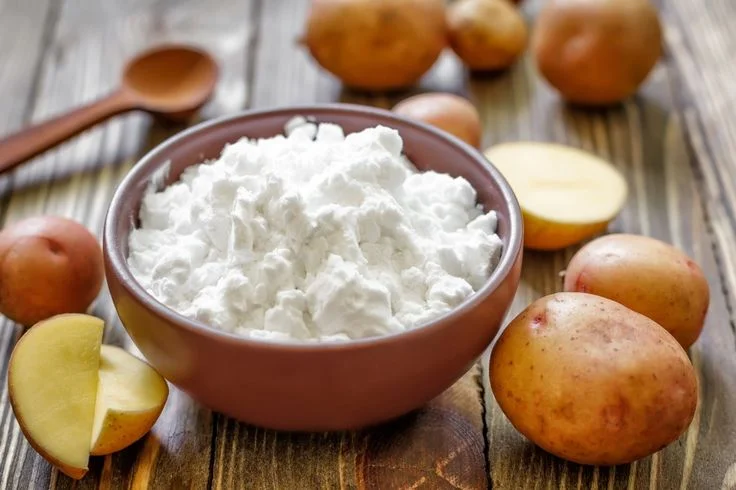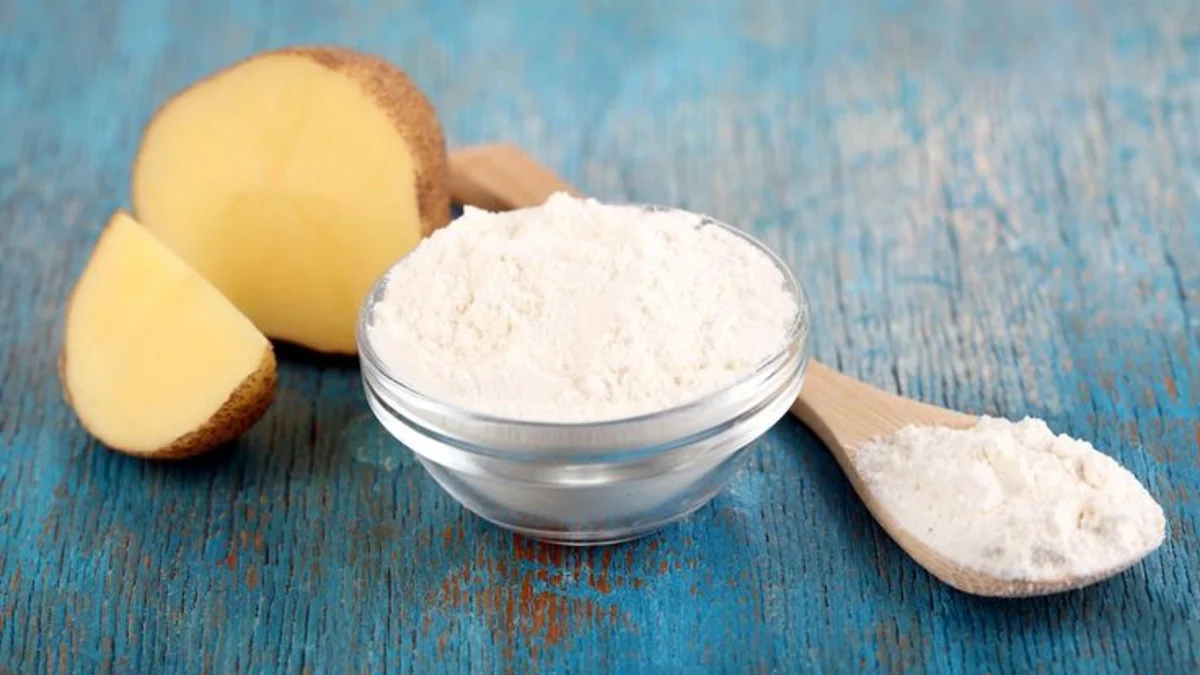Did you know that potato starch is not only a versatile ingredient in cooking, but also has numerous health benefits? Many people are unaware of the powerful impact that it can have on their overall well-being. It’s time to uncover the amazing health benefits of this humble pantry staple.
Potato starch has been used for centuries in various culinary dishes, but its health benefits are often overlooked. From aiding in digestion to promoting weight loss, there are countless reasons to incorporate it into your diet. Let’s explore the incredible benefits that this underrated ingredient has to offer.
Potato Starch nutrition profile

| Nutrient | Amount per 100g |
|---|---|
| Calories | 333 kcal |
| Total Fat | 0.1 g |
| Saturated Fat | 0 g |
| Trans Fat | 0 g |
| Cholesterol | 0 mg |
| Sodium | 55 mg |
| Total Carbohydrates | 83 g |
| Dietary Fiber | 0.5 g |
| Sugars | 0 g |
| Protein | 0.1 g |
| Calcium | 10 mg |
| Iron | 0.3 mg |
| Potassium | 20 mg |
| Vitamin C | 0 mg |
| Vitamin A | 0 IU |
Uses of Potato Starch
Frying food
It could be used as a coating for fried foods. Before frying, it can be used to cover fish, poultry, and vegetables.
During the frying process, the potato starch coating can give the food an outside layer that is crispy and golden.
Thickening agents
Since potato starch absorbs water well, it is frequently used as a thickener in a variety of cuisines. On the other hand, excessive heat can cause the starch to decompose and stop absorbing moisture, which would limit the thickening effect. Therefore, it is advised to boil the starch slowly before progressively adding it to sauces.
Potato starch is used as a thickening factor in casseroles, stews, pie fillings, soups, and gravies.
Potato Starch Benefits
1. It could increase sensitivity to insulin.
Resistant starch has been found in some studies to improve insulin sensitivity. This kind of starch is found in raw it, which is sprinkled over food.
In a 2012 study, overweight men consumed only 15–30 grams (g) of resistant starch daily. In comparison, individuals who had not been consuming foods high in resistant starch displayed higher insulin sensitivity.
Reduced risk of obesity, diabetes, and heart disease can be attributed to increased insulin sensitivity.
It is important to note, though, that the outcomes of this study were different for the female participants than for the male ones. To find the cause, researchers urge more investigation.
2. can help with colon and digestive health.
Short-chain fatty acids are produced and beneficial bacteria in the colon are fed as resistant starch ferments.
During this process, butyrate, a short-chain fatty acid, is formed; it is essential to the colon’s cells.
Butyrate can lower colon inflammation, which lowers a person’s chance of experiencing a variety of digestive problems.
3. Resistance starch could enhance attempts to lose weight.
A 2017 investigation Consuming resistant starch makes people feel fuller after meals, according to Trusted Source. For six weeks, each participant in the study consumed 30 g of resistant starch daily. This lessened the quantity of hormones that would normally cause appetite in those who were overweight.
Those who consumed resistant starch also exhibited higher concentrations of substances that reduced their morning hunger.
By prolonging the sensation of fullness following a meal and improving the duration of fullness, resistant starch in the diet may support attempts to lose weight.
Risks of potato starch
In general, there are not many health hazards associated with it. Similar to fiber, resistant starches like it have extremely few after-consumption adverse effects.
On the other hand, some people could discover that consuming a lot of it causes bloating and gas.
potato starch alternatives
There are numerous alternatives to potato starch. A person can replace it with one of the following options:
- Cornstarch is ideal for thickening sauces and frying.
- Wheat flour is suitable for baking, however it contains gluten.
- Arrowroot powder is gluten-free and can be used to thicken recipes.
- Rice flour is a gluten-free flour that can be used to thicken sauces and baked goods.
- Tapioca starch is useful for gluten-free baking and thickening sauces.
Potato starch vs. potato flour
| Nutrient/Property | Potato Starch | Potato Flour |
|---|---|---|
| Source | Extracted from it granules | Whole potatoes (peeled, cooked, dried, ground) |
| Appearance | Fine, white powder | Fine, off-white to cream-colored powder |
| Taste | Neutral, flavorless | Mild potato flavor |
| Calories (per 100g) | 333 kcal | 357 kcal |
| Total Fat (per 100g) | 0.1 g | 0.34 g |
| Total Carbohydrates (per 100g) | 83 g | 83.1 g |
| Dietary Fiber (per 100g) | 0.5 g | 5.9 g |
| Sugars (per 100g) | 0 g | 3.3 g |
| Protein (per 100g) | 0.1 g | 6.9 g |
| Sodium (per 100g) | 55 mg | 55 mg |
| Calcium (per 100g) | 10 mg | 40 mg |
| Iron (per 100g) | 0.3 mg | 1.28 mg |
| Potassium (per 100g) | 20 mg | 1,332 mg |
| Vitamin C (per 100g) | 0 mg | 33 mg |
| Gluten-Free | Yes | Yes |
| Uses | Thickening agent in soups, sauces, and gravies | Baking, thickening, gluten-free recipes |
| Water Absorption | Low | High |
Summary
It may be used as an ingredient in various recipes. It is useful for thickening sauces, making a gluten-free addition to baking recipes, and acting as a suitable coating for dishes while frying.
It may also provide various health benefits, such as enhanced colon health and insulin sensitivity. It may also help with weight loss efforts.
Cornstarch, arrowroot powder, rice flour, and tapioca starch are all appropriate alternatives to potato starch.
FAQs
Is potato starch good for health?
Is potato starch healthier than flour?
Does potato starch have side effects?
References
- https://pubmed.ncbi.nlm.nih.gov/28753728/
- https://www.ncbi.nlm.nih.gov/pmc/articles/PMC5646248/
Disclaimer: The information provided here is for educational/awareness purposes only and is not intended to be a substitute for medical treatment by a healthcare professional and should not be relied upon to diagnose or treat any medical condition. The reader should consult a registered medical practitioner to determine the appropriateness of the information before consuming any medication. Elnodi does not provide any guarantee or warranty (express or implied) regarding the accuracy, adequacy, completeness, legality, reliability, or usefulness of the information; and disclaims any liability arising thereof.





